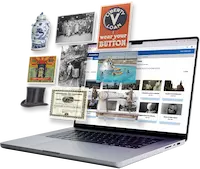Archival Collaborations: Technology, Planning, Learning, and Trust

Margot Note
Archivists are crucial in preserving and organizing historical records in the ever-evolving information management landscape.
Beyond the traditional aspects of their work, archivists leverage technology to enhance collaboration within their teams and across organizations. When archivists embrace digital platforms, they integrate archival practices into strategic planning, foster continuous learning, seek feedback, and build meaningful partnerships.
Embracing Platforms
In the digital age, archivists have adopted technology to transform collaborations. Digital platforms are a communication, project management, and resource-sharing hub. By utilizing these tools, archivists facilitate coordination among team members, enabling them to track progress, assign tasks, and share updates. This digital integration streamlines workflow and creates an inclusive work environment where information flows and collaboration becomes second nature.
Moreover, integrating technology into archival practices has revolutionized collaboration and affected the preservation and accessibility of historical records. Digital archives allow archivists to digitize and catalog vast amounts of documents, photos, and artifacts, making them searchable and available to a broader audience. This shift towards digital preservation ensures the longevity of valuable historical materials and broadens public access to cultural heritage. Data management and storage technology advancements also provide archivists with robust tools to safeguard fragile and aging materials, ensuring their continued existence for future generations. As the digital landscape evolves, archivists find themselves at the forefront of innovation, adapting and embracing new technologies to fulfill their crucial role in preserving our collective past.
Aligning Practices with Planning
Archivists are not confined to preserving historical documents; they contribute to an organization’s strategic planning. By aligning their work with the organization’s mission and goals, archivists showcase the relevance of archival practices. This strategic alignment positions archivists as integral contributors to the organizational vision. The past becomes a guide for the present, and archivists play a pivotal role in shaping an empowered future through cross-functional alliances.
Archivists shape the trajectory of an organization. Beyond the preservation of documents, they are key participants in the strategic planning process, ensuring that their efforts align with the overarching mission and objectives of the organization. By showcasing the relevance of archival practices, archivists connect the past to the present and position themselves as contributors to realizing the organizational vision. The records curated by archivists serve as a guide, offering insights that aid decision-making and strategic foresight. Through fostering cross-functional alliances, archivists contribute to creating a foundation for an empowered future, where the lessons of the past inform and empower the organization in its ongoing endeavors. Archivists emerge as dynamic agents shaping the narrative of history and the organization’s future.
Fostering Continuous Learning
Continuous learning is at the core of archival success. Archivists are facilitators of knowledge growth within their teams. Archivists stimulate innovative thinking and problem solving by advancing a culture of curiosity and exploration. Training sessions, workshops, and seminars equip team members with the skills and knowledge required for collaborative archival projects. In doing so, archivists ensure that their teams remain dynamic and adaptable to the evolving information management landscape.
The pursuit of excellence requires a willingness to receive constructive criticism. Archivists understand the value of feedback in improving their services. Regular evaluations of collaborations provide insights into the effectiveness of archival projects and ensure that they align with their intended aims. By seeking and implementing feedback, archivists demonstrate their commitment to continuous improvement and dedication to delivering value to all parties involved.
Building Trust
Building collaborative relationships is an art that archivists master over time. It involves patience, trust-building, and consistent reliability. Archivists solidify their reputation as dependable allies by delivering on promises and exceeding expectations. Identifying common goals, nurturing relationships, and embracing reciprocity are key elements in forging meaningful partnerships. Through these partnerships, archivists expand the influence of archival services, contributing to innovation within organizations.
As archivists embark on their collaboration journey, they contribute to an empowered organizational future. The integration of technology, alignment with strategic goals, commitment to continuous learning, openness to feedback, and the cultivation of meaningful partnerships collectively shape an environment where the past informs the present and cross-functional alliances drive future success. Archivists are architects of an organizational legacy that thrives on collaboration and innovation.

Margot Note
To learn more, please join us for a free webinar, Unlocking Potential through Collaborations, Wednesday, August 14, 2024 at 11 a.m. Pacific, 2 p.m. Eastern. (Can’t make it? Register anyway and we will send you a link to the recording afterwards). Register now.
Never miss another post. Subscribe today!
Similar Posts
Principles of Archival Preservation: Agents of Deterioration and Preservation Strategies
Explore the 5 key agents of deterioration and essential archival preservation strategies to safeguard your collections for future generations.
Creating Effective Archival Finding Aids: Tips for Writing Clear Descriptions
Clear concise archival descriptions improve accessibility support discoverability and enhance the research experience. In this article we’ll explore best practices for crafting finding aids that are both informative and engaging.
Balancing Collection- and
Item-Level Information in Archival Description
How much detail is enough when describing an archival collection? Finding the right balance between broad overviews and detailed item descriptions ensures accessibility research efficiency and proper context for archival materials.
Best Practices in Archival Description
Standards like ISAD(G) DACS and EAD guide archivists in creating clear consistent descriptions for easier access. Learn more about each of these frameworks and how they enhance visibility and research.







Leave a Comment
Comments are reviewed and must adhere to our comments policy.
0 Comments